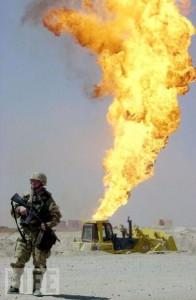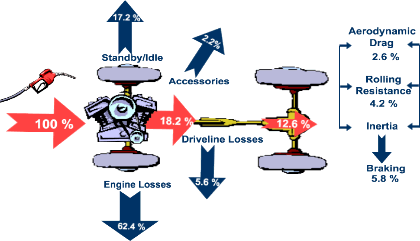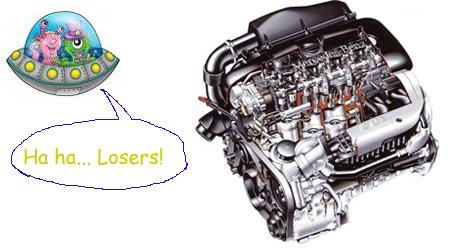This blog is in response1 to Patrick's excellent M.A.D. 2.0 article. It started as a comment, but I thought, what the heck, let's make it my first blog. I've got to make the leap at some point instead of just lurking and hijacking!I've come to the conclusion that there is only one thing worse than running out of oil - and that is NOT running out of oil. As the prospect of continuous but ever depleting reserves of hydrocarbons seems quite likely, it becomes even more essential we find alternatives to our current toxic habits. As Patrick clearly articulates, we will be up to our ear-balls in muck if we don't stop using oil. If not us, certainly our children.
Not too long ago, many of our esteemed leaders from around the globe got together in Copenhagen to talk about, of all things, the weather. Quite the hot topic now, eh! It was a bit surreal for me - nobody threatening mass death&destruction or economic havoc... I had to pinch myself! The wrangling continues today in Cancún, Mexico, and unsurprisingly, has not produced any convincing results. What I like about these get together's however is the gradual, if somewhat reluctant, unity being shown. This is excellent practice for global human unity. And this unity is an essential ingredient in any future imagined brightly.
Yet, if we look at all the noise, confusion and misinformation being generated by the global-warming debate, we can recognize it as a distraction from the real issue - that of resource depletion, respect for our environment and respect for the next generation. If we address these issues, the red-herring of global-warming will begin to resolve itself. Why do I say red-herring? Because we can and should change our reckless behavior regardless of whether global warming is real or imagined.
We are in an age of combustion. Energy resources remain the central engine to our industrialized economies, and fire, pretty much the lowest grade of energy, has been doing work for humanity since we snatched the first burning stick from the lightning tree.
Fire's first work was to help us keep warm, find our way through dark caves, and to act as predator repellent. Later, we learned to cook with it, and thus we had pre-digested food... some of the work of digestion being
 performed by the cooking process. We cleared land with fire, hunted with fire, then progressed to manipulating metals such as bronze and iron with fire.
performed by the cooking process. We cleared land with fire, hunted with fire, then progressed to manipulating metals such as bronze and iron with fire.The big breakthrough came with the industrial revolution, spawning the age of industry. The laws of thermodynamics were identified, explored and put to use. The central concept to this revolution was to convert the heat energy of fire directly to work - to moving things. We weren’t too concerned about the efficiency of our machines, just with their ability to greatly magnify our work capacity. At this point in time, coincidentally or not, the global-warming process appears to have begun.
Not long after, we learned to utilize nuclear energy. When we are not making even bigger bangs2 with it, we construct gigantic kettles that boil water to drive turbines, fired by secondary low-grade heat radiation generated by the controlled decay of radioactive elements. The promise of the nuclear age has been bitter-sweet, and still leaves us dependent on heat engines to get things done.
We say now that we are in the information age. So there are two engines driving quality of life in society: heat engines and information engines (computers). The distinction turns out to be blurry. To process information requires energy, which turns out to be deeply connected with entropy, and the laws of thermodynamics. We need heat engines to drive information engines. Just ask Google what their power bill is if you want a concrete example. It turns out that even cyberspace is fundamentally energy dependent.
So, through all these ages; stone, bronze, iron, industrial, nuclear and information, we have an over-arching age, that of Combustion. A more technically correct term might be the "Thermal Age”, or perhaps the age of “delta-T", but as combustion is the dominant method, and the heat-engine is still king, we won't split hairs. No matter how you call it, for the last ten-thousand years or more, we have been burning to live.
Thermodynamic guards at the gate
Early in my career, a mentor taught me a simple fact about combustion engines in vehicles. Of the chemical energy fed to the engine via the gas tank, on average, 80% is converted directly to heat, with the remaining 20% left to move the vehicle. On top of that, every time we hit the brakes, we dump all that hard won kinetic energy to heating the brake disks.

Here’s another way to look at it. If you drive a vehicle powered by a 100kW engine at full load, you effectively have an 80kW heater to keep you toasty in the cab. Imagine 40 two-kilowatt radiant heaters running in your home, and you’ll get the picture. This fact left a deep impression on me, and led me to explore (and wrestle) with the laws of thermodynamics.
The truth is, when it comes to the energy sector of industry, we have made very little progress relative to other industries. Our vehicles still mostly “suck/bang/push/turn/fart” (repeat many times a second, and you have an internal combustion engine). They absolutely squander the energy provided by hydrocarbons in our tanks. Apart from materials and control, they are essentially the same as they were over a century ago.
Things have improved though: on average, our cars run around 25% efficiency to get them moving. In general though, due to abundance of petrochemicals, and government subsidies kicking in as they became less abundant, auto-engineers have had little to zero incentive to improve. On the larger scale, for combustion fueled power-stations, 50% thermal efficiency is about as good as we get.
Is this as good as we can do? Pretty much, yes. It’s those cursed laws of thermodynamics, like guards at a gate, seemingly impassable. An attitude of complacency has descended on us. It’s almost like we are saying, “What’s the point? The laws of thermo won’t let us, and besides, the whole shebang eventually ends in a tepid heat death. We might as well give up now!”.
This defeatist attitude permeates industry, and therefore society, at all levels. If we waste energy, it is no surprise we do the same to our other important resources. Our attitude to waste is ignorant to say the least, even if we are swimming in it. Take a plastic toy product, or packaging item. All these require expensive tooling, and consume material resources directly and indirectly. There is a huge block of energy-consuming steel behind every single piece of formed metal or plastic moulding. Plastic is itself a petrochemical family of materials, requiring a great deal of energy to process. Every piece of aluminium alloy you come across is really a metal battery - actually made of and by electricity. To my disgust, a great deal of cheaply made products don't even fulfill the function that they were produced for - they merely imitate and disintegrate. This is the ultimate in arrogance and waste.
There’s another problem. Two of the key attributes of liquid hydrocarbons as a fuel are energy density and mobility. So far, we don't have anything that improves on a gas-tank for its practical ability to fulfill these attributes. This is why it is so hard to replace, and why it is so addictive. Any alternative solutions have to address these two issues.

In Patrick's M.A.D. 2.0 article he states that we can't argue with the laws of thermodynamics - they rise above any political spin, red-herrings and bullshit that are all designed to distract us from the implications of these laws. Now we have a stark truth to face: Are we to burn our way to the future?
To burn our future, oops, to burn our way to the future, seems ridiculous to me. Putting it bluntly, it is so primitive. Where's the fundamental advance from our ten-thousand year old ancestors? I'm an engineer, and imagining a long-term future dependent on combustion is unacceptable to me. I have far higher (non-burning) ambitions for society.
Do we really want to be at this base level, say 10 generations from now? Renewable energy such as solar, wind and moon power (tidal), whilst being sensible and necessary in the short term, just won't cut it for the long term. We are an ambitious race, and this needs to be acknowledged. So even though we don’t know just how yet, why not at least have the confidence that we can and eventually will find another way?
Richard a. Sears, “The Stone-age did not end because we ran out of stones...”
The long-term challenge then is not only to reduce waste caused by squandering precious energy resources, but to find new methods of powering our machinery - a source that no longer requires a fire in its belly. In short, we need to learn how to tap deeper into nature’s energy well, and leave the Age of Fire behind.
(My next blog will trace the origins of the energy we utilize. )Notes:
1. I wrote the article, but was unable to blog at that time, hence the delay. Now I can, so thanks Science2.0, I feel privileged to be here!
2. No Street-View for Mesa Rd, sorry. I'm not sure when the Google car will roll along these mean streets.




Comments